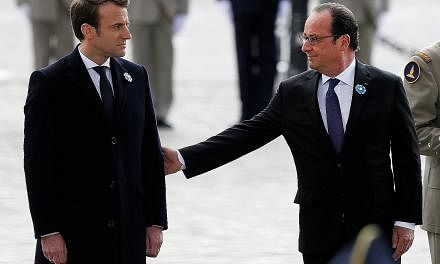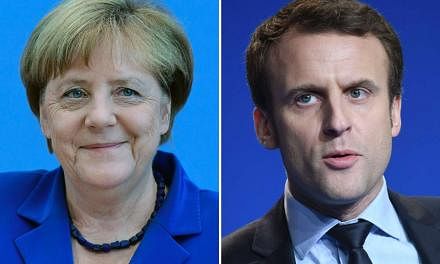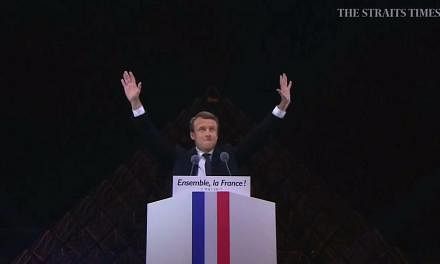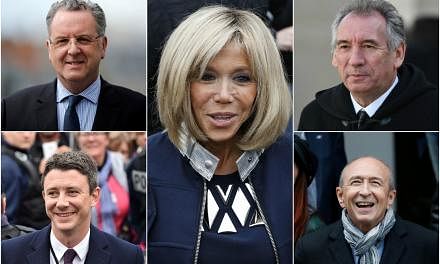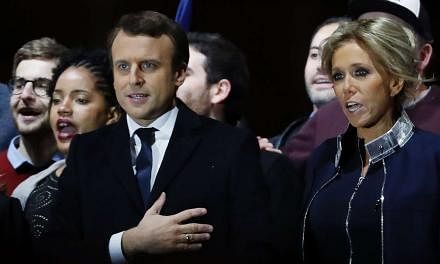Mr Emmanuel Macron, France's president-elect, has used his victory speech to reassure those Frenchmen and women who did not vote for him that he understands their "anger, anxiety and doubt".
Speaking to tens of thousands of enthusiastic flag-waving supporters massed in the quadrangle of the landmark Louvre museum in the heart of Paris during the early hours of Monday morning (May 8), Mr Macron, who now becomes France's youngest head of state since Emperor Napoleon more than two centuries ago, vowed to "calm people's fears, restore France's confidence, and gather all its people together to face the immense challenges that face us in the future".
But although the margin of Mr Macron's electoral victory was bigger than initially predicted - he defeated Ms Marine Le Pen, the leader of the far-right, anti-immigrant National Front by a whopping 66.06 per cent majority on Sunday - a closer look at his success indicates that he will find it very difficult to heal France's political divisions.
The impact of France's presidential ballot extends far beyond the country's borders. After the victory of anti-European Union campaigners in a British referendum and the election of Donald Trump as US president, the received wisdom was that other European countries would also fall under the spell of right-wing populist politicians. And France looked as the ripest European country in this respect, since it has the National Front, a well-established nationalist political movement, led by Ms Le Pen, Europe's most popular and most successful far-right politician.
The fact that Ms Le Pen has now lost badly - the 33.94 per cent of the vote she got was much worse than the 40 per cent opinion polls initially predicted - means that the French elections have punctured the idea that the march of nationalists is unstoppable. A key European country has now voted to be ruled by a politician who continues to believe in free trade, open borders and closer European integration.
Europe's prospects are, therefore, brighter than the continent's politicians initially feared, a point subtly underlined by president-elect Macron, who came on stage for his acceptance speech to the strains of the European Union anthem.
Still, the number of voters that Ms Le Pen attracted on Sunday was twice as big as that which Mr Jean-Marie Le Pen, her father and former National Front leader, obtained when he contested the French presidency back in 2002. So although Ms Le Pen now has to wait until 2022 before she could aim again for the presidency, she has made great strides.
-
France's handover timetable
-
10 May - France's Constitutional Council, the country's highest legal authority, formally proclaims Emmanuel Macron as the next president
13 May - Transfer of powers to Mr Macron. In keeping with tradition, the new president's first act is to lay a wreath at the Tomb of the Unknown Soldier at Paris' Arc de Triomphe and visit the Paris town hall
15 May - Formal swearing-in of a new prime minister
19 May - Nominations for parliamentary elections close
22 May - Parliamentary electoral campaign starts
11 and 18 June - First and second rounds of parliamentary elections
Early indications that her National Front party is now thinking of renaming itself and ditching some of its anti-EU policies suggest that it intends to remain a formidable fighting force. Either way, a mere one year ago the National Front could still be dismissed as a fringe movement. Today, however, it can plausibly claim to represent France's real opposition, as both of the country's mainstream parties are nowhere to be seen.
It's also worth noting that one in four of those entitled to vote failed to turn out on Sunday, accounting for the highest non-participation rate in a second round of the French elections in almost half a century.
Sunday's vote also recorded the highest number of spoilt ballots ever, yet another pointer that Mr Macron's vote was less a positive choice about him, and more a vote against Ms Len Pen. Indeed, exit polls conducted immediately after voting stations closed on Sunday indicated that only 16 per cent of those who voted for Mr Macron did so because they believed in his governance programme; almost half of Mr Macron's electorate was composed of people who simply wanted to block Ms Le Pen.
And then, there are indications that no less than 44 per cent of French voters in the 18 to 24 age bracket opted Ms Le Pen; president-elect Macron is the choice of older voters, while the National Front attracts a disproportionate segment of the young, an ominous indicator in itself.
In short, although Mr Macron has been handed an opportunity to change France, his mandate is far less solid than currently assumed, and his window of opportunity remains narrow. For in a month from now, France will hold parliamentary elections and Mr Macron, who has no political party, has 10 days to find candidates to fill no less than 577 parliamentary constituencies.
France's president-elect claims to be undaunted by the challenges which lie ahead. Which is just as well, since these are huge.


